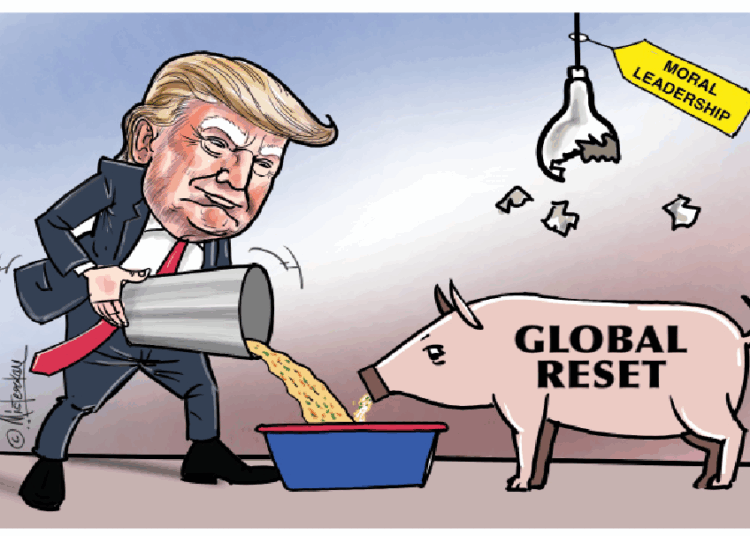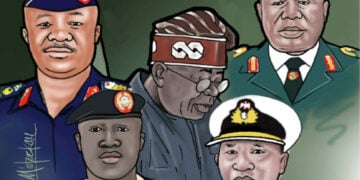President Donald Trump’s recent working visit to the Middle East – including Saudi Arabia, the United Arab Emirates, and Qatar – may well represent a turning point in U.S. foreign policy. Over the course of this trip, Trump signed deals spanning energy cooperation, defense agreements, and trade expansion. But more than the contracts, it is his blunt message that captures global attention: the United States will no longer be in the business of “giving lectures” on governance or values.
In Riyadh, Trump openly stated that Washington would stop its long-held role as the world’s moral arbiter. This is a break from the diplomatic tradition that has shaped American policy since World War II – a tradition rooted in idealism and liberal internationalism. Whether intended or not, Trump’s comments may mark a pivot from values-driven diplomacy toward a more transactional and realist approach, where sovereignty and mutual benefit matter most.
This shift could be seen as an adjustment to the realities of a changing world order. Maybe, the American “exceptionalism” that defined decades of foreign policy has lost some of its credibility, especially among rising powers and developing nations who seek respect for their autonomy rather than moral prescriptions.
The Waning of the Liberal Order
For nearly 80 years, the United States projected itself as the leader of a liberal international order, a rules-based system that promoted democracy, human rights, and open markets. This order was not perfect, but it shaped global institutions and norms that defined the post-Cold War era.
However, the cracks in this order have been widening. The rise of China and the BRICS countries presents an alternative model based on sovereignty and non-interference. It’s possible, as Singapore’s Kishore Mahbubani argues, that many countries no longer see Western values as universal. Instead, they view Washington’s moralism as outdated, sometimes hypocritical, and increasingly irrelevant.
Fareed Zakaria has noted that the U.S. is no longer the unchallenged hegemon it once was. The global power balance is moving toward multipolarity, a world where several states wield significant influence and where cooperation, rather than domination, is necessary. Trump’s blunt rejection of America’s lecturing role fits into this evolving context. Maybe it reflects a pragmatic acknowledgment that Washington must engage with others on a more equal footing.
Trump’s Realism vs. Biden’s Idealism
President Joe Biden’s foreign policy has sought to restore traditional U.S. leadership through alliance-building and values-driven diplomacy. His administration’s strong support for Ukraine in its conflict with Russia and efforts to confront China on issues like Taiwan reflect this strategy.
Yet, Biden’s approach carries risks. It may deepen U.S. entanglements abroad and alienate countries that chafe at moralizing or security guarantees that come with strings attached. The costs of sustaining global leadership through ideological contests and military commitments are high.
Trump’s approach, by contrast, emphasizes America’s economic and industrial strength as the foundation for global influence. His focus on securing better trade deals, cutting unnecessary military adventures, and prioritizing national interests echoes historian Paul Kennedy’s warnings about “imperial overstretch.” Maybe Trump is responding to a need for America to recalibrate its global ambitions realistically, recognizing the limits of its resources.
However, this approach has contradictions. Economic nationalism and tariff wars might signal strength domestically, but Edward Luce warns that America’s future competitiveness depends on innovation, technology, and integration into global value chains, not the revival of old manufacturing. Trump’s nostalgia for a past industrial glory may therefore be more symbolic than strategic.
Nonetheless, it’s possible that Trump’s transactional diplomacy better suits today’s multipolar world, where power is more diffuse and cooperation is increasingly based on shared interests rather than shared values.
Implications for Nigeria and Africa
For Nigeria and the broader African continent, this evolving U.S. approach presents both opportunities and challenges. Trump’s focus on pragmatic, deal-based partnerships, eschewing the usual conditionalities tied to governance or human rights, may open new avenues for equitable engagement.
African countries have long expressed frustration with foreign aid models that come with strings attached, demanding reforms often seen as imposed or out of sync with local realities. Trump’s emphasis on trade, security cooperation, and investment may align better with Nigeria’s developmental goals. During his Middle East visit, Trump’s deals on energy and trade provide a template that Nigeria could emulate to attract similar partnerships that advance industrialization and infrastructure.
Yet, it’s also possible that deprioritizing values-based diplomacy could weaken international pressure for governance reforms and conflict resolution on the continent, issues that remain critical for sustainable development and stability.
Nigeria, as Africa’s largest economy, stands at a crossroads. It must navigate the new U.S. posture while simultaneously engaging with other global players. China’s expanding influence, through state-led investments and infrastructure financing, offers an alternative model, while the European Union remains a key partner for development aid and trade.
Europe’s current challenges highlight the risks of overdependence on external powers. Biden’s policies have increased Europe’s reliance on the U.S. economically and militarily, especially following sanctions on Russia that disrupted energy supplies. Meanwhile, Trump’s criticism of NATO and skepticism of multilateral institutions may encourage Europe to pursue strategic autonomy – though the path will be difficult and fraught with uncertainty.
A World Less Led by America
Trump’s presidency might be seen as a catalyst accelerating a global reset. By dropping the rhetoric of moral leadership and embracing a more transactional, interest-based diplomacy, Trump has perhaps unintentionally forced the international community to accept a less American-centric order.
The liberal international system, once underpinned by U.S. ideals and institutions, is increasingly contested. Instead, the emerging world order is multipolar – shaped by China, Russia, the European Union, India, and rising regional powers like Nigeria.
In this multipolar world, cooperation depends less on shared ideology and more on mutual interests. Challenges such as climate change, global health crises, technological governance, and trade demand collaboration, but on terms that respect sovereignty and diverse priorities.
For Nigeria, this means adopting a flexible, pragmatic approach. It should engage with the U.S. on commercial and security terms aligned with its national interests, without expecting Washington to lead on governance or human rights. Concurrently, Nigeria needs to deepen strategic ties with China, the EU, and other emerging powers, building a diversified portfolio of partnerships.
Adapting to a Complex Reality
Trump’s foreign policy is not without shortcomings. It risks weakening longstanding alliances and creating vacuums in global governance that adversaries could exploit. His economic nationalism can disrupt global supply chains and provoke trade tensions.
Yet Trump’s approach maybe the necessary acknowledgement that America can no longer dictate global affairs through moral authority or military force alone.
For Nigeria, the challenge is clear. It must adapt to a more complex international environment where no single power reigns supreme. That means cultivating diverse partnerships, prioritizing pragmatic trade and investment, and managing geopolitical risks with a clear-eyed realism.
President Trump’s recent Middle East visit and his forthright messages to allies embody this new reality. The age of America lecturing the world is passing. The era of pragmatic, interest-driven engagement has arrived.
Nigeria stands at a critical juncture. It can embrace this new order and pursue strategic flexibility to maximize its interests, or it can cling to outdated expectations that may marginalize it in the evolving global landscape.





